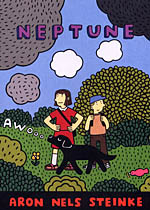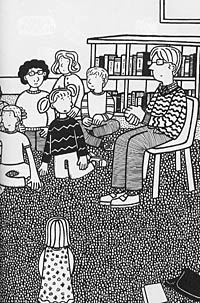 By Aron Nels Steinke
By Aron Nels Steinke
160 pages, black and white
Published by Sparkplug Comic Books and Tugboat Press
Sometimes all it takes to attract a reader is an attractive cover. Aron Nels Steinke’s Neptune is the sort of book whose cover promises exactly what it delivers on the inside. It’s a simple illustration style with a surprising amount of detail the more you look at it, and with the promise of fun. There’s an innocence about the cover too, and I think that’s the best way to describe the experience of reading Neptune. I’ve enjoyed Steinke’s short stories in Papercutter up until now, but now that I’ve read an extended story by him I want to see more.
 Neptune is written by Steinke in a easy-paced, somewhat meandering style. As he introduces Erika, her brother Patrick, and their new dog Neptune, there’s a definite goal in mind but Steinke is in no hurry to get there. So as Erika and Patrick discover a dog in their house, head to school, or deal with a freak flood, there are little side routes and detours along the way. We get the kids making up songs about school (as they slowly head there after missing the bus), taking poorly-constructed tests in class, and dealing with a vice principal who is convinced that Neptune is going to give her yellow fever. It’s those pieces of story that make Neptune come to life, though, and are responsible for a lot of its charm. You get the feeling that these are actual children, with their own flights of fancy and carefree attitude.
Neptune is written by Steinke in a easy-paced, somewhat meandering style. As he introduces Erika, her brother Patrick, and their new dog Neptune, there’s a definite goal in mind but Steinke is in no hurry to get there. So as Erika and Patrick discover a dog in their house, head to school, or deal with a freak flood, there are little side routes and detours along the way. We get the kids making up songs about school (as they slowly head there after missing the bus), taking poorly-constructed tests in class, and dealing with a vice principal who is convinced that Neptune is going to give her yellow fever. It’s those pieces of story that make Neptune come to life, though, and are responsible for a lot of its charm. You get the feeling that these are actual children, with their own flights of fancy and carefree attitude.
 It’s this writing style, coupled with Steinke’s art, that brings an almost dream-like quality to several parts of the book. When the great flood hits town, what could have been drawn in a sinister manner is instead calm and awe-inspiring. From the wave towering over the children, to the moment that it crashes down and the pages are filled with images of flowing water, it doesn’t feel so much dangerous as it does peaceful. Maybe it’s the way that the two children drift through panels so that it doesn’t seem scary, but Steinke brings a zen-like moment to what could have been played for high drama.
It’s this writing style, coupled with Steinke’s art, that brings an almost dream-like quality to several parts of the book. When the great flood hits town, what could have been drawn in a sinister manner is instead calm and awe-inspiring. From the wave towering over the children, to the moment that it crashes down and the pages are filled with images of flowing water, it doesn’t feel so much dangerous as it does peaceful. Maybe it’s the way that the two children drift through panels so that it doesn’t seem scary, but Steinke brings a zen-like moment to what could have been played for high drama.
Steinke’s art in general is deceiving to those who haven’t encountered it before. Steinke draws his characters in a stripped down, basic style; dots for eyes and a single line for a mouth. There’s a ton of detail here, though, more often than not in the backgrounds. The carpet in a classroom has every single fiber drawn, or thousands of leaves move with the branches of a tree as they sway in the storm’s winds. At the same time, though, Steinke knows when to include the background details and when to leave them out. There are some scenes where the focus needs to be just on the characters speaking, and that’s when Steinke puts them on a black background, no details at all for the reader. It’s an effective choice, controlling exactly the reader should look at.
Neptune is a sweet all-ages book; it may be intended to be friendly for younger readers, but it’s just as entertaining for an older reader too. There’s so much to love, even down to the back cover’s comic strip where the main characters try and explain what the book is about. There, Erika says, "But please, take your time. It’s not a race… reading should never be a race." That’s absolutely true with Neptune; half of the joy is going through and re-reading the book at a slow pace, reveling in its charm. Definitely check it out.
